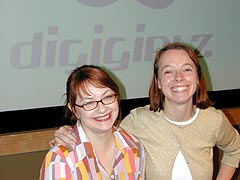EDITORS’ UPDATE, Aug. 31, 2004
— Portions of this article have been rewritten to more accurately reflect the origins of the DigiGirlz in 2001.
REDMOND, Wash., Aug. 23, 2004 — Four years ago, the first DigiGirlz High Tech Camp took place at Microsoft’s Redmond campus, with over 60 participants. Carola Dopps, then a consultant for the High-Tech Learning Centers, a program of the Northeast Vocational Area Cooperative, approached Microsoft Diversity with an idea for a high-tech learning camp for girls, seeking ways to spark young women’s interest in technology careers. Computer science is a field in which female participation has decreased in recent years, and according to some studies, women received less than 28 percent of computer science bachelor’s degrees in 2000 — down from 37 percent in 1984.

Melora Zaner-Godsey (left) and Asta Roseway, two of the organizers of the annual DigiGirlz Technology Camp, held at Microsoft’s Redmond campus. Click image for high-res version.
Currently, women make up just 19 percent of the science, engineering and technology work force, sectors of employment that are quickly expanding. The Bureau of Labor Statistics’ growth projections for 1996 through 2006 shows that the number of core IT workers will grow from 1.5 million in 1996 to 2.6 million in 2006. Dopps, now Director of the Academy of Information Technology, realized that more needed to be done to expose young women to the abundant career opportunities in these growing fields.
So in 2001, Dopps, along with Microsoft Diversity, created the DigiGirlz summer camp, an annual event that brings high-school girls to Microsoft’s Redmond campus for four days of workshops, discussions and visits with product teams and other employees.
“Our goal is to encourage these girls, many of whom otherwise do not have the opportunity, to learn new skills and broaden their perspective on technical education,” said Emily McKeon, a Corporate Diversity specialist who coordinates the camp.
This year’s camp was held Aug. 9-12, and over 80 girls attended from across Washington state. In workshops camp attendees built and designed Web pages, learned basic programming skills, and experimented with user interface design architecture.
Melora Zaner-Godsey, a user experience architect for MSN, said girls who come to the camp with little exposure to technology or interest in a technology career emerge with new excitement and perspective on opportunities in the technology field. “We develop long-term relationships with these girls,” she said. “I’m still in touch with one girl who started as a DigiGirl, then worked here as a high-school intern, and now is in college getting straight A’s in computer science.”
Asta Roseway, a design research lead for MSN, added that planning DigiGirlz and interacting with girls in camp workshops give a higher purpose to her work at Microsoft. “When we hear how girls feel empowered and more confident, we are contributing to something larger,” she said. “It enables me to put my personal passion into what I do here.”
Taylor Belsvik, a second-year Microsoft high-school intern who spent the summer working in Corporate Diversity, first attended DigiGirlz camp three years ago. “One thing I learned in DigiGirlz is you need to pursue your own interests,” Belsvik said. After experimenting with programming and testing in a technical internship last summer, she shifted her career path to roles that required more interpersonal skills. “DigiGirlz helped me realize I can always incorporate technology into whatever career path I choose,” she said. When she enters Northeastern University in Boston in September, Belsvik will pursue a degree in human development and American Sign Language.
Kelly Rincon, who will be a senior at Seattle’s Ingraham High School this fall, returned for her third DigiGirlz camp experience this year. Rincon comes from a family where no one has background or experience with computers, so when she heard about the DigiGirlz camp, she jumped at the opportunity to attend. She remembers feeling a bit intimidated when she showed up for her first day of camp, but it didn’t take long before she was meeting other girls and digging into workshops.
“It gave me confidence, and helped me figure out what should I study in high school,” Rincon said. “Now I can be the person who makes others comfortable.”
Among the more technical classes Rincon pursued as a result of DigiGirlz were Cisco networking, Visual Basic and HTML. More recently, she’s become interested in the business side of technology.
Among the senior women at Microsoft who spoke at this year’s event was Tammy Savage, product unit manager for MSN, who in her keynote encouraged girls to create opportunities for themselves.
“There are going to be a lot of people who tell you, ‘no,'” she said. “Don’t listen to them. There are things that will get in your way — things that look like mountains,” Whatever you choose to do, you can do. All you have to remember is there’s a path there. You have to keep looking.”





